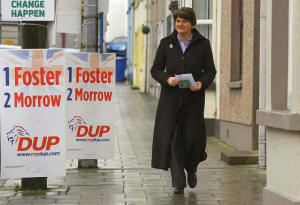|
Bruised DUP edge buoyant Sinn Fein in
Northern Ireland election
 Send a link to a friend
Send a link to a friend
 [March 04, 2017]
By Ian Graham [March 04, 2017]
By Ian Graham
BELFAST (Reuters) - The pro-British
Democratic Unionist Party narrowly remained Northern Ireland's largest
party after edging Irish nationalists Sinn Fein by a single seat in snap
elections ahead of arduous talks to resurrect their power-sharing
government.
Voters turned out in their highest numbers in two decades on Thursday in
the first regional election in the United Kingdom since its vote to
leave the European Union as nationalists who favor a united Ireland and
unionists who want the province to remain British jostle for influence.
The DUP won 28 of the 90 seats as a surging Sinn Fein almost wiped out
the 10-seat advantage the DUP secured in elections a year ago. Just over
1,000 votes split the main parties from the 800,000 ballots cast in the
closest ever assembly election.
"Let us now move forward with hope, hope that civility can return to our
politics," outgoing first minister Arlene Foster of the DUP told
supporters after her re-election on Friday. "There is work to be done to
quickly mend the relationship which has been frayed by the discord of
this election."
Foster's conciliatory tone after her party's disappointing result was in
stark contrast from an acrimonious campaign where, despite pleas from
Dublin and London to avoid a further souring of relations, the two
parties rallied their sectarian bases.

Sinn Fein's leader Michelle O'Neill told journalists it was an "amazing
day" as her party benefited from a jump in turnout to 65 percent, the
highest since the first elections immediately after the 1998 Good Friday
peace agreement.
It was the closest nationalists, traditionally backed by Catholics, had
ever come to becoming the largest party in the Protestant-majority
province. Unionists candidates, who tend to be favored by Protestants,
captured less than half of the seats for the first time.
The DUP's failure to win at least 30 seats also means it no longer has
the power to veto legislation on its own, something the conservative
party has done to block extending gay marriage to the province.
POWER-SHARING
The two largest parties will have three weeks to form a new
power-sharing government to avoid devolved power returning to the
British parliament at Westminster for the first time in a decade.
But with relations at their lowest point in a decade, Sinn Fein insists
among its demands for re-entering government that Foster must step aside
while months of investigations begin into a botched green energy scheme
she established.
[to top of second column] |

Arlene Foster, leader of the DUP (Democratic Unionist Party) walks
towards a polling station in the Northern Ireland Assembly elections
in Brookeborough in Northern Ireland, March 2, 2017. REUTERS/Toby
Melville

The former political wing of the Irish Republican Army, who accused
the DUP of not treating it as equals before collapsing the previous
administration in January, will be further buoyed by their strong
showing.
"The prospect of a devolved government being formed, which was
already slim anyway, is very remote. I just don't see it happening,"
said Jon Tonge, professor of politics at Liverpool University.
No one predicts the impasse will bring a return to the violence that
killed 3,600 people in the three decades before the peace agreement.
But some are warning there could be a deterioration in community
relations coupled with government paralysis, as Brexit talks
determine the province's political and economic future.
Sinn Fein President Gerry Adams said he could not guarantee that the
return of Northern Ireland's 1.8 million people to direct rule from
London could be avoided.
"That would be a total failure of the politicians of Northern
Ireland," Peter Hain, the last British minister for Northern Ireland
to oversee direct rule in 2007, told Sky News.
"To effectively hand power back to London would I think be a
disaster for devolution and a serious setback for progress in
Northern Ireland."
(Writing, additional reporting by Conor Humphries and Padraic
Halpin; Editing by Alison Williams and Lisa Shumaker)
[© 2017 Thomson Reuters. All rights
reserved.]
Copyright 2017 Reuters. All rights reserved. This material may not be published,
broadcast, rewritten or redistributed.
 |